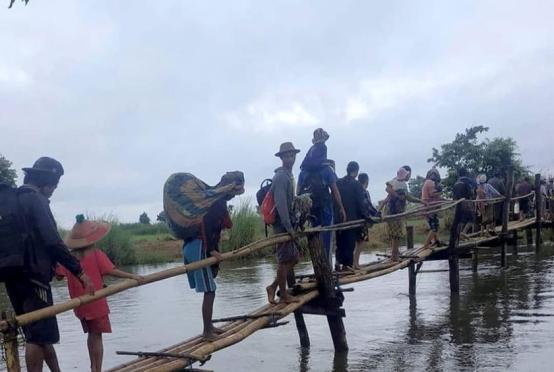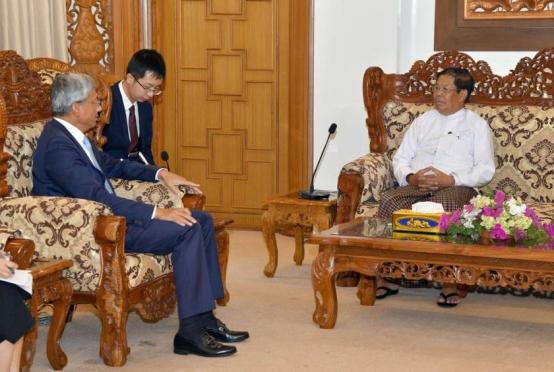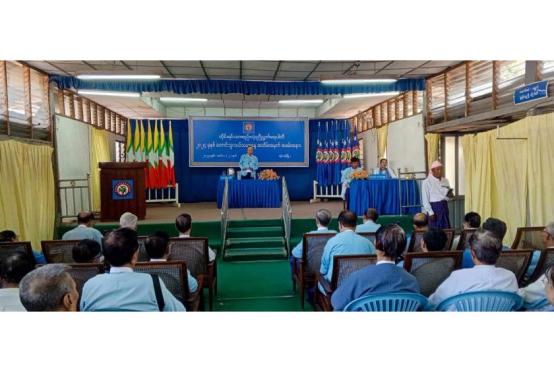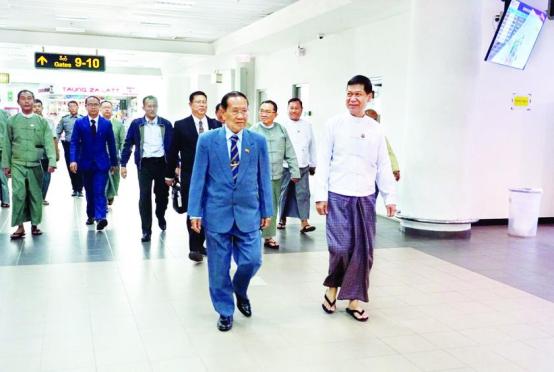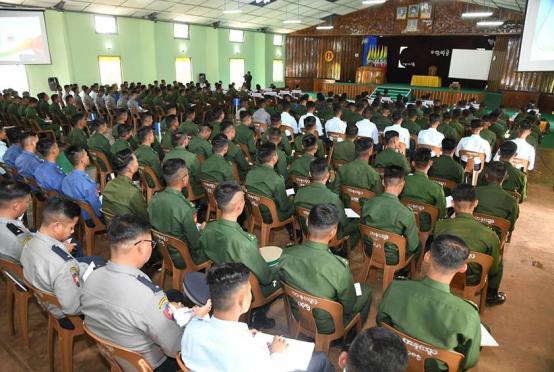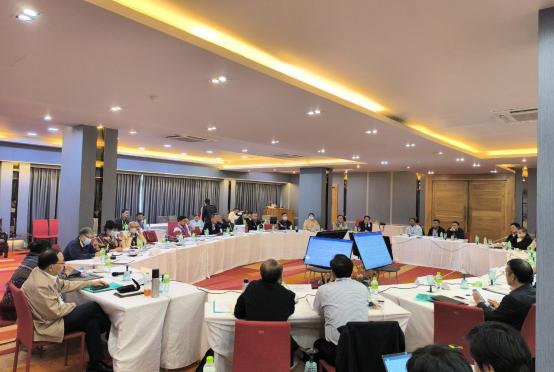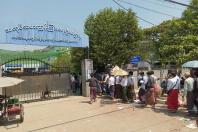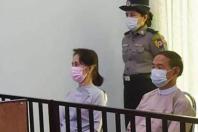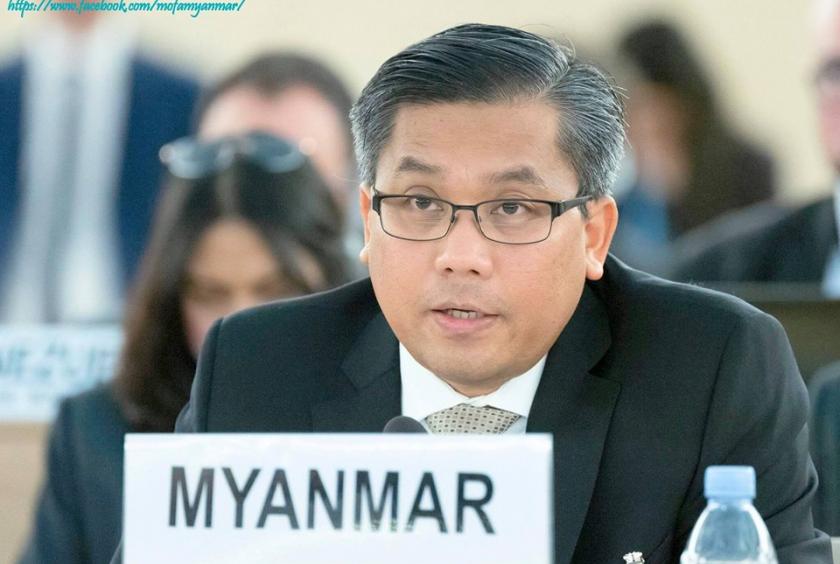
The draft resolution on “Situation of Human Rights in Myanmar” tabled by the European Union (EU) was considered for action on 22 March 2019 at the 40th Regular Session of the United Nations Human Rights Council in Geneva.
Myanmar categorically rejected the draft resolution.
In the statement delivered as a concerned country before taking action on the draft resolution, Permanent Representative of Myanmar U Kyaw Moe Tun highlighted the following main reasons why the resolution is not accepted by Myanmar.
First, the EU’s justification for the draft resolution is mainly based on the one-sided narratives, highly politicized and seriously flawed reports of the FFM and the Special Rapporteur that Myanmar has categorically object, said U Kyaw Moe Tun.
Second, the draft resolution clearly demonstrates its intent to garner international pressure against Myanmar by passing one resolution after resolution and heaping mechanism over mechanism on our country. It contains a number of paragraphs, based on sweeping allegations, aiming to impose unprecedented discriminatory scrutiny on Myanmar by abusing various UN mechanisms under the name of human rights. Today, Myanmar is under the scrutiny of multiple UN mechanisms, said U Kyaw Moe Tun.
Third, the tone and tenor of the draft resolution demonstrates a total disregard for the dignity, sovereignty, and territorial integrity of a sovereign UN member state. It is seen a “classic example” of double standards and, selective and discriminatory application of human rights norms on a developing country in democratic transition, said U Kyaw Moe Tun.
Fourth, although the draft resolution is labelled “Situation of human rights in Myanmar”, a large number of paragraphs narrowly focus, with negative perspective, on the rights of a particular group in Rakhine. Myanmar will never allow any attempt that can have negative impact for the social cohesion and unity among different ethnic and religious communities in the country, said U Kyaw Moe Tun.
Fifth, the EU’s draft resolution sows the seeds of mistrust and further polarization not only among different communities in the country in particular in Rakhine but also between Myanmar and the international community. It is imbued with retributive and punitive undertone rather than seeking solution, understanding and reconciliation, said U Kyaw Moe Tun.
Sixth, the draft resolution deliberately ignored the threat of terrorism which is the real cause of present humanitarian situation. This calls for a great concern with regard to the true intention and sincerity of the cosponsors, said U Kyaw Moe Tun.
Seventh, as a principle, Myanmar is against country-specific resolutions, said U Kyaw Moe Tun.
The Permanent Representative said, “Myanmar categorically rejects the draft resolution L.19”, due to these reasons and stressed, “Myanmar shall not be bound by this unfair resolution.”
The Permanent Representative stated that although some paragraphs, contained in the draft resolution, acknowledged and welcomed a few parts from many positive developments in Myanmar, the aforementioned factually-flawed, intrusive, politically driven sovereignty-infringing paragraphs had far surpassed them.
He stressed, “The adoption of yet another ill-intentioned, selectively targeted and politically motivated resolution will not help Myanmar”.
“If there is genuine will, there is room for the EU and other cosponsors to play a more constructive role in assisting Myanmar’s democratic transition”, he added.
In his statement, U Kyaw Moe Tun also emphasized the importance of constructive approach and genuine cooperation for the promotion and protection of human rights. He reiterated the firm commitment by the government and people of Myanmar to continue working towards achieving the goal of building a democratic federal union.
The Permanent Representative also stated that Myanmar “is resolute to find a sustainable solution to the issue in Rakhine State” and welcomed the “constructive cooperation with sincere intention” from the international community.
He concluded by expressing Myanmar Government’s sincere gratitude to the delegations standing firm on their principled position in supporting Myanmar and requested the member states of the Council to vote against the draft resolution.
The Chinese Representative, exercising its right as a member of the Council, called for a vote by stating that the draft resolution will further complicate the situation on the ground rather than solving problems; positive progress including economic development and peace process of Myanmar should be much recognized; the concerned country, Myanmar rejected the draft resolution; and the international community should respect Myanmar’s sovereignty.
The draft resolution was put to a vote at the 47-member Human Rights Council, and adopted with a vote of 3 against, 7 abstentions and 37 in favour.
China, Cuba and the Philippines voted against the resolution in support of Myanmar. The other 7 countries - Angola, Cameroon, Democratic Republic of the Congo, India, Japan, Nepal and Senegal - did not support the EU’s resolution and abstained in the voting.
Edited by Win Htut

